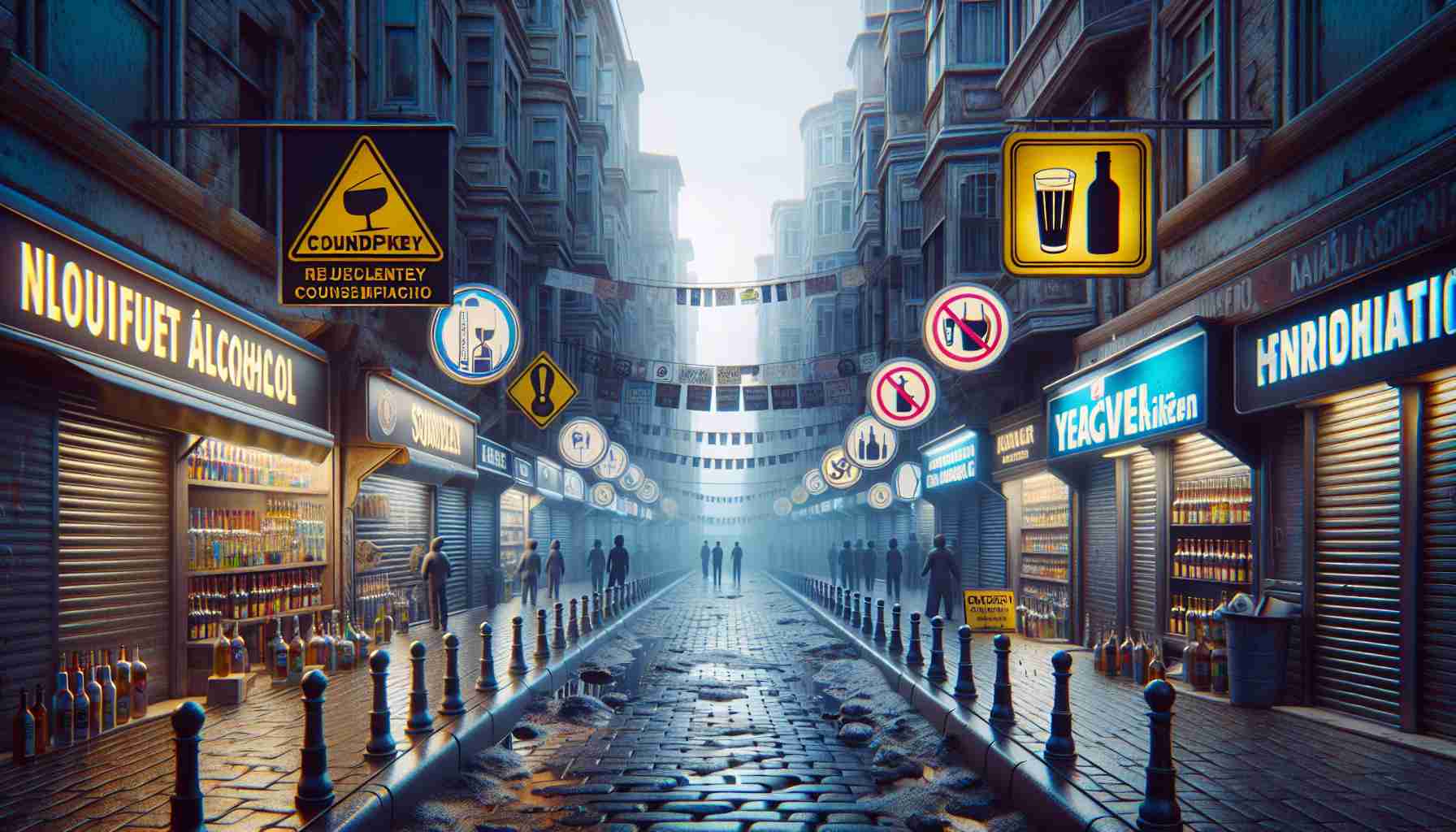Recent events in Istanbul highlight a dire public health crisis.
In Istanbul, a shocking spike in fatalities linked to counterfeit alcohol has alarmed authorities. Within a span of 72 hours, 19 individuals tragically lost their lives after consuming illegal spirits. Additionally, 65 others were hospitalized, prompting immediate action from the Istanbul government.
In the wake of this crisis, the authorities investigated local vendors, leading to the revocation of licenses from 63 establishments and the closure of several locations known for illegal alcohol sales. This troubling trend is exacerbated by Turkey’s high alcohol taxes, which have driven some to concoct their own beverages using industrial-grade methanol, a highly toxic substance.
Consuming even a small amount of methanol can result in severe health issues such as headaches, dizziness, and in extreme cases, can lead to blindness or kidney failure. Recently, the governor of Istanbul emphasized that all individuals associated with these deaths would face legal consequences.
Last year, cases of illegal alcohol poisoning in the city resulted in 110 individuals being affected, with 48 succumbing to their conditions. In response to the ongoing issue, the Istanbul government has implemented a mandatory 24/7 video surveillance system for all alcohol retailers since October of last year, further intensifying their crackdown against illegal sales and the production of counterfeit spirits.
Public Health Crisis and Its Broader Implications
The alarming rise in fatalities due to counterfeit alcohol in Istanbul serves as a stark reminder of the inherent risks linked to illegal trade and public health. This crisis, deeply rooted in socio-economic factors, underscores significant ramifications for society and the culture surrounding alcohol consumption. As stringent alcohol taxes push consumers towards the illicit market, a troubling cycle emerges whereby desperation leads to hazardous choices, dramatically impacting community health and safety.
From a broader perspective, the global economy stands to feel the strain as countries grapple with similar issues. The informal economy thrives amidst stringent regulations, potentially costing governments billions in lost tax revenue. Moreover, the ramifications extend beyond just financial concerns; the lack of regulation in unlicensed establishments can escalate into a public nuisance, disrupting the peace and safety of neighborhoods.
Environmental implications also arise in the wake of such crises. The production of illegal alcohol often involves the improper disposal of toxic substances, posing risks to local ecosystems and public resources. Continued reliance on low-quality, unregulated products may escalate pollution levels, further complicating health concerns in urban environments.
Looking forward, there is an urgent need for comprehensive policy responses—both in Istanbul and globally. Enhanced regulatory measures and public awareness campaigns may prove essential in mitigating the risks associated with counterfeit products. Ultimately, addressing these challenges thoughtfully could forge a pathway towards healthier communities and sustainable practices moving forward.
Recent Surge in Alcohol-Related Deaths Sparks Urgent Health Reforms in Istanbul
Overview of the Crisis
Istanbul is currently grappling with a severe public health crisis as a significant increase in fatalities linked to counterfeit alcohol has emerged. Just within 72 hours, 19 individuals were reported dead after consuming illegal spirits, alongside 65 others requiring hospitalization. This alarming situation has escalated into an urgent call for action from local authorities to address public safety and health concerns surrounding illicit alcohol production and consumption.
Government Response and Measures
In order to combat this crisis, the Istanbul government has swiftly launched a comprehensive investigation into local vendors. This effort has resulted in the revocation of licenses from 63 establishments, and several locations notorious for illicit alcohol sales have been shut down. The authorities are not only targeting the distribution of counterfeit spirits but are also focusing on the production side by investigating illicit manufacturing practices that utilize toxic substances such as industrial-grade methanol.
Health Risks Associated with Counterfeit Alcohol
The risks associated with consuming counterfeit alcohol are severe. Methanol, often used in the illicit production of spirits, poses a particularly dangerous threat. Just a small dose can lead to symptoms such as headaches and dizziness, but higher volumes may cause significant health complications, including blindness and kidney failure. As a result, the public is being urged to avoid consuming alcohol from unregulated sources.
Historical Context and Previous Incidents
This recent spike in alcohol-related incidents is not isolated. Last year, Istanbul experienced a wave of illegal alcohol poisoning, affecting 110 individuals and resulting in 48 fatalities. This underscores a persistent issue with covert alcohol production fueled by high alcohol taxation in Turkey, which pushes some individuals to create homemade spirits, often at the cost of their health and safety.
New Surveillance Practices
In response to the ongoing crisis, the Istanbul government has enforced a mandatory 24/7 video surveillance requirement for all alcohol retailers since October of the previous year. This measure aims to intensify the regulatory landscape surrounding alcohol sales and deter illegal activity by increasing accountability among vendors.
Future Trends and Insights
As authorities continue to confront the challenges posed by counterfeit alcohol consumption, the issue is expected to remain prevalent unless comprehensive measures are implemented. Improved education surrounding the dangers of illegal alcohol, alongside stricter enforcement of laws and regulations, will be essential in preventing future tragedies. Community awareness programs may also play a critical role in informing the public about the hazards associated with counterfeit spirits.
Conclusion
The recent events in Istanbul highlight a pressing public health dilemma that necessitates immediate and sustained action from both city officials and the community. As the city grapples with this deadly crisis, it remains crucial for both authorities and citizens to work together in fostering a safer environment free from the perils of counterfeit alcohol.
For further information on public health policies and news updates, visit WHO.
